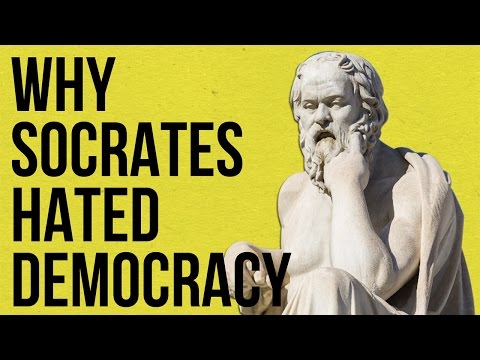(单词翻译:单击)
We are used to thinking very highly of democracy –
我们已经习惯了民主至高无上的地位,
and by extension, of Ancient Athens, the civilisation that gave rise to it.
并对古雅典也爱屋及乌,这个文明产生了民主制。
The Parthenon has become almost a byword for democratic values,
帕特农神庙几乎成了民主价值的象征,
which is why so many leaders of democracies like to be photographed there.
这也是为什么很多民主领袖喜欢在那里留影。
It’s therefore very striking to discover that one of Ancient Greece’s great achievements,
因此你会很意外的发现,古希腊最伟大的成就之一

Philosophy, was highly suspicious of its other achievement, Democracy.
哲学,对它另一个伟大成就非常怀疑,民主
The founding father of Greek Philosophy – Socrates – is portrayed,
古希腊哲学之父苏格拉底,
in the dialogues of Plato, as hugely pessimistic about the whole business of democracy.
在《柏拉图对话录》中对民主这整件事都非常非常悲观
In Book Six of The Republic, Plato describes
在《理想国》第六卷中,柏拉图描述了
Socrates falling into conversation with a character called Adeimantus and trying to
苏格拉底和一位叫阿狄曼图的人有一段对话
get him to see the flaws of democracy by comparing a society to a ship.
并试图让他看到民主制的缺陷,用的是一条船来做比喻。
If you were heading out on a journey by sea, asks Socrates, who would you ideally want deciding who was in charge of the vessel?
“如果你开始一段海上的旅途,”苏格拉底问道,“你觉得谁是掌控大船的理想人选?”
Just anyone or people educated in the rules and demands of seafaring?
“就是任何人,”“还是受过培训,了解航海规则和要求的人?”
The latter of course, says Adeimantus, so why then, responds Socrates, do we keep thinking
“当然是后者。”阿狄曼图说,“所以为什么,” 苏格拉底回应道
that any old person should be fit to judge who should be a ruler of a country?
“我们就觉得任何老者”“都适合评判谁是一个国家的统治者?”
Socrates’s point is that voting in an election is a skill, not a random intuition.
苏格拉底的观点是,选举中的投票是一项技能,而不是随机的直觉
And like any skill, it needs to be taught systematically to people.
而像任何技能一样,它需要系统地教授给人民
Letting the citizenry vote without an education is as irresponsible as putting them in charge of a trireme sailing to Samos in a storm.
让未受培育的全体市民投票是不负责的,就和让他们去掌管风暴中驶往萨摩斯岛的战船一样不负责。
Socrates was to have first hand, catastrophic experience of the foolishness of voters.
苏格拉底对选民的愚蠢有灾难性的亲身经历。
In 399 BC, the philosopher was put on trial on trumped up charges of corrupting the youth of Athens.
公元前399年,这位哲学家因捏造的罪名受审,罪名是腐蚀雅典青年思想
A jury of 500 Athenians was invited to weigh up the case and decided by a narrow margin that the philosopher was guilty.
500个雅典人组成的评审团受邀评估这个案件,并以微弱优势判定苏格拉底有罪
He was put to death by hemlock in a process which is,
他通过饮下毒堇汁被处死
for thinking people, every bit as tragic as Jesus’s condemnation has been for Christians.
这对喜爱思考之人来说异常悲惨,就像耶稣的定罪对基督教徒那样悲惨
Crucially, Socrates was not elitist in the normal sense.
最重要的是,苏格拉底并不是普通意义上的精英主义者
He didn’t believe that a narrow few should only ever vote.
他并不相信只有极少数人有权投票。
He did, however, insist that only those who had thought about issues rationally and deeply should be let near a vote.
而是坚称只有那些理性思考,深刻思考问题的人才该有投票权
We have forgotten this distinction
我们已经忘掉这个区别
between an intellectual democracy and a democracy by birthright.
在“知识性民主”和“天生民主”之间的区别
We have given the vote to all without connecting it to wisdom.
我们把投票权给了所有人,没有把它和智慧联系起来
And Socrates knew exactly where that would lead: to a system the Greeks feared above all, demagoguery.
而苏格拉底很清楚这会导致什么,那就是希腊人最怕的体制——煽动制。
Ancient Athens had painful experience of demagogues, for example, the louche figure of Alcibiades,
古雅典对煽动者有痛苦的经历,比如,阿尔西比亚德斯声名狼藉的形象
a rich, charismatic, smooth-talking wealthy man who eroded basic freedoms and helped to
一个魅力非凡,巧舌如簧的富人,他践踏了基本自由
push Athens to its disastrous military adventures in Sicily.
并推动雅典在西西里岛的军事冒险。
Socrates knew how easily people seeking election could exploit our desire for easy answers.
苏格拉底知道,谋求选举的人有多容易(让我们夺回控制!)用简单的答案来利用我们的愿望.
He asked us to imagine an election debate between two candidates,
他让我们想象一场两个候选人间的选举辩论
one who was like a doctor and the other who was like a sweet shop owner.
一个人像医生,而另一个人像一个糖果店老板
The sweet shop owner would say of his rival: Look, this person here has worked many evils on you.
糖果店老板会这么说他的对手:“看!这个人对你们做了很多邪恶的事,”
He hurts you, gives you bitter potions and tells you not to eat and drink whatever you like.
“他弄伤你们,给你们苦药水,”“还不让你们吃喝喜欢的东西!”
He’ll never serve you feasts of many and varied pleasant things like I will.
“他绝不会给你们多种多样的丰富盛宴,”“而我会!”
Socrates asks us to consider the audience response:
苏格拉底让我们思考观众的回应
Do you think the doctor would be able to reply effectively?
你觉得医生会有力地回应吗?
The true answer – ‘I cause you trouble, and go against you desires in order to help you’ would cause an uproar among the voters,
诚实的答案:“我给你们造成麻烦,还违背你们意愿,”“是为了帮助你们。”会引起投票者中的骚乱
Don’t you think? We have forgotten all about Socrates’s salient warnings against democracy.
你不觉得吗?我们完全忘了苏格拉底反对民主制的重要警告。
We have preferred to think of democracy as an unambiguous good –
我们更愿意认为民主就是非常明确的好东西
rather than as something that is only ever as effective as the education system that surrounds it.
而不是一个只有在教育系统辅佐它时才有效的东西
As a result, we have elected many sweet shop owners, and very few doctors.
结果就是,我们选出了很多糖果店老板和很少的医生。


